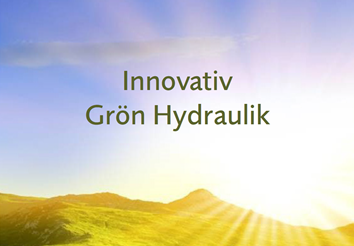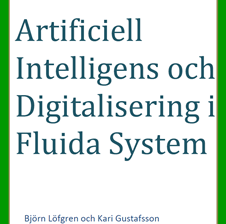
Feasibility study on AI in the fluid industry
Based on the report “Artificial Intelligence and Digitization in the Fluid Industry”, SFMA will conduct a feasibility study in the spring of 2021. The report shows that the global fluid industry is facing major upheavals in the long term. Digitization and AI are strong driving forces. The report also shows that there are several investments in digitization and AI, especially among the major global system integrators of fluid technology and fluid component and system manufacturers (eg Volvo CE, Komatsu, Epiroc and Bosch Rexroth, Parker Hannifin) and only a few investments in the small ones. and medium-sized fluid component and system manufacturers.
The structure, challenges and tasks of the feasibility study
- What does the Swedish fluid industry's need for AI look like in the short and long term perspective?
- How should a tactical plan be implemented in the best way, which companies, organizations and actors should participate in the region (projects)?
- What activities and projects already exist that we can build on?
- What competencies are there among companies and other actors in the regions linked to AI?
- With which Universities and Colleges can we collaborate in the best way on both competence-enhancing initiatives for member companies and specific product development projects?
Feasibility study supplies:
PHASE 1
- Conducted member survey on the needs picture. More than 50 companies in different sectors (forest, industry, plant and more) and in different parts of the value chain (components, systems, integrators) have been interviewed Completed on January 15, 2021, see webinar
PHASE 2
- • How can an imaginary test bed for an AI demonstrator be realized? What should it show? Are components or fluid systems to be demonstrated? In which application?
- • How will future AI activities be organized in the future and what specifically will SFMA's role be vis-à-vis other actors and projects?
- • What resources will be needed?
- • Can we, and do we have the conditions to, start applying for both co-financing in a future major industry investment as well as project financing for specific AI projects at SFMA's member companies? Where can you apply for funding for the various projects?
Phase 2 will be ready on June 1, 2021
2020-12-07
Artificial Intelligence and Digitization in Fluid Systems
Now, four years later, after the development of the agenda, we have entered the next technological leap, artificial intelligence (AI). Although AI today is a very hyped concept and is reminiscent of other rapidly emerging technologies, which later crashed (Virtual Reality and the IT boom in 1999), there are major underlying differences with the emergence of AI. The most important thing is that AI has technically already come so far that it has begun to be implemented in several industries (media, communication and finance) and that important prerequisites for AI, such as data clouds for storing large amounts of data and that various IT platforms are widely available today at a low cost. Add the very powerful IT tools available at a relatively low cost to build AI applications. In several respected contexts, AI is referred to as an event of greater significance than when the steam engine made its entrance into society. In the spring of 2020, SFMA analyzed what AI can give the fluid industry. The purpose of the report is to demonstrate the great importance that artificial intelligence will bring to the Swedish fluid industry and highlight the commercial opportunities that are now rapidly emerging by exploiting AI technology. The report shows the status of AI in the global and Swedish fluid industry and the ongoing research and development globally and nationally in AI. An approach to a strategic and tactical plan for how the Swedish fluid industry should act in the future, so as not to lose pace in the introduction of AI, is presented to the Swedish fluid industry.
Innovative green hydraulics
During a three-year period until 2016, SFMA (IFS and HPF) developed a strategic agenda for the hydraulics industry called "Innovative Green Hydraulics". Sweden's successful development of hydraulic technology has resulted in Swedish companies taking a world-leading role in a large number of industrial sectors where hydraulics is a key technology in industrial products, but also in the establishment of several world-leading Swedish companies that develop and manufacture hydraulic components and systems. From submarines to vehicles, forestry, agricultural and construction machinery, cranes, wave and wind power, equipment and systems for the process industry to aviation. Exports of goods from these industrial goods amount to SEK 100 billion or 10% of the value of goods in Swedish industrial exports. The number of full-time employees amounts to almost 50,000 people.
The plan presented aims to strengthen the development of new innovative products and solutions for a wide range of industrial applications that are in global demand. The plan brings together Sweden's world-leading hydraulics industry - both small and large companies, Swedish research, actors and organizations in hydraulics in a joint strategic research and innovation plan until the year 2030.
Reports

Here you can download the report, in swedish

Here you can download the report, in swedish
Artificial intelligence and digitization in fluid systems
Webinars in AI
As part of SFMA's newly launched investment in AI, we are now starting up a series of webinars. These aim to spread knowledge and provide good examples of new applications / customer offerings concerning AI and digitization.
Completed webinars
January 19, 2021
AI Webinar on MacGregor's OnWatch Scout Monitoring System for Offshore and Merchant Cranes
First out on the track was Daniel Lundberg at MacGregor Norway A / S, who told us about their monitoring system - OnWatch Scout - for offshore and merchant cranes. Why was the investment made? What business reasons were there? How did they go about getting started and how was it anchored in the organization?
